小学牛津6A Unit6默写
6a Unit 6重点
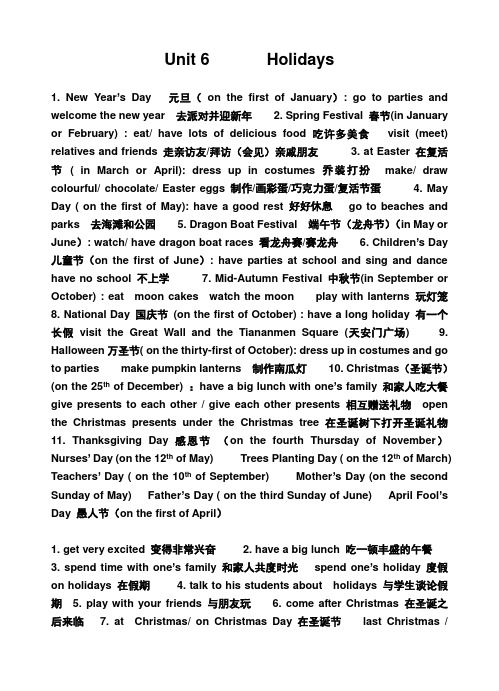
Unit 6 Holidays1. New Year’s Day 元旦(on the first of January): go to parties and welcome the new year 去派对并迎新年2. Spring Festival 春节(in January or February) : eat/ have lots of delicious food 吃许多美食visit (meet) relatives and friends 走亲访友/拜访(会见)亲戚朋友3. at Easter 在复活节( in March or April): dress up in costumes 乔装打扮make/ draw colourful/ chocolate/ Easter eggs 制作/画彩蛋/巧克力蛋/复活节蛋4. May Day ( on the first of May): have a good rest 好好休息go to beaches and parks 去海滩和公园5. Dragon Boat Festival 端午节(龙舟节)(in May or June): watch/ have dragon boat races 看龙舟赛/赛龙舟6. Children’s Day 儿童节(on the first of June): have parties at school and sing and dance have no school 不上学7. Mid-Autumn Festival 中秋节(in September or October) : eat moon cakes watch the moon play with lanterns 玩灯笼8. National Day 国庆节(on the first of October) : have a long holiday 有一个长假visit the Great Wall and the Tiananmen Square (天安门广场)9. Halloween万圣节( on the thirty-first of October): dress up in costumes and go to parties make pumpkin lanterns 制作南瓜灯10. Christmas(圣诞节)(on the 25th of December) :have a big lunch with one’s family 和家人吃大餐give presents to each other / give each other presents 相互赠送礼物open the Christmas presents under the Christmas tree 在圣诞树下打开圣诞礼物11. Thanksgiving Day 感恩节(on the fourth Thursday of November)Nurses’ Day (on the 12th of May) Trees Planting Day ( on the 12th of March) Teachers’ Day ( on the 10th of September) Mother’s Day (on the second Sunday of May) Father’s Day ( on the third Sunday of June) April Fool’s Day 愚人节(on the first of April)1. get very excited 变得非常兴奋2. have a big lunch 吃一顿丰盛的午餐3. spend time with one’s family 和家人共度时光spend one’s holiday 度假on holidays 在假期4. talk to his students about holidays 与学生谈论假期5. play with your friends 与朋友玩6. come after Christmas 在圣诞之后来临7. at Christmas/ on Christmas Day 在圣诞节last Christmas /Christmas last year去年圣诞8. my favourite holiday 我最喜欢的假期9. catch grasshoppers in the grass 抓在草丛中的蚱蜢10. go there by bus 坐公共汽车去那儿11. read a letter from his penfriend 读一封他笔友的来信12. a popular holiday in China 一个在中国广为流传的节日13. have a wonderful holiday 有个/过个精彩的假期14. eat a lot 吃许多15. have some drinks 喝些饮料16. jump away 跳走17. be tired but happy 累然而快乐18. play with balloons 玩气球1. join the dots 连线2. talk to your partner 和你的同伴讨论3. practise in groups 小组操练4. with your group members 和你的组员5. number the sentences in the correct order 按正确的顺序给句子写号6. with the correct words 用正确的单词7. complete the sentences 完成句子8. fill in the blanks 缺词填空9. for a class project 为了一个班级课题10. play the“Bingo”game 玩“宾果”游戏11. listen and repeat 听并重复12. a sweet smell of tangerine 一种柑橘的甜甜的味道13. a holiday full of love and joy 一个充满爱和欢乐的假日14. a holiday for everyone to enjoy 一个让每个人都享受其中的假日15. say a rhyme 说首小诗1.When’s Halloween? It’s on the 31st of October/ in October.万圣节在什么时候?在十月三十一日、十月份。
Unit6知识梳理

知识点一Unit6 Going to school 知识梳理Part 1词汇语法复习(1)根据对应的音标和词性,写出单词的中英文6A U6 Vocabulary (牛津)序号 英文 音标 词性 中文 1 /ˈtrævl/ v. 行走;旅行 2 /əˈbaʊt/ adv. 大约 3 /'mɪnɪt/ n. 分钟 4 [ˈferi] n. 渡船 5 [ˈaʊə(r)] n. 小时 6 [həʊˈtel] n. 旅馆 7 [ədˈvɜ:tɪsmənt]n. 广告 8[bɔ:d]n.栏;板教学目标1) 学习6A U6重点词汇2) 学习并了解不定代词a few, some, a lot of 的用法 3) 学习How long 引导的特殊疑问句 4) 学习连词when 的用法5) 精读:在阅读中训练从各类语篇中获取信息、理解等能力教学重点1) 6AU6重点词汇2) 不定代词a few, some, a lot of 的用法 3) How long 引导的特殊疑问句 4) 连词when 的用法章节知识导航1)知识点一:6A U6词汇详解 2)知识点二:单元重点语法3)知识点三:话题阅读及写作:故事、观察与见闻知识点二9[wen]conj.当……的时候10[lait reil]n.轻轨11[diˈpɑ:tmənt stɔ:]n.百货商店12[ˈkɪndəgɑ:tn]n.幼儿园13[ˈhauziŋ isˈteit]n.居民区14[ˈtempl]n.庙宇15[hɑ:f æn ˈauə]半小时16[ə fju:]几个17[ə lɔt ɔv]许多【答案】travel about minute ferry hour hotel advertisement board when light rail department store kindergarten housing estate temple half an hour a few a lot of6A U6语法重难点1. be/live near some place 离/住得离某地近My school is _______ my home. 我家离学校很近。
牛津苏教版-英语-六年级上册-6A Unit6Holidays知识点讲解

【高效课堂】6A Unit6Holidays知识点讲解1.本单元接触了许多节日名称:新年New Year’s Day 万圣节前夕Halloween劳动节May Day 春节Spring Festival儿童节Children’s Day 国庆节National Day复活节Easter 中秋节Mid-Autumn Festival龙舟节/端午节Dragon Boat Festival除此之外,我们再学习一些:中国青年节Chinese Youth Day母(父)亲节Mother’s/Father’s Day元宵节Lantern Festival妇女节Women’s Day建军节Army Day2.also副词:也、还;too副词:也;它们的用法有一定区别:too放在肯定句或疑问句的末尾,too之前一般有逗号;also一般用在实意动词之前,助动词之后。
如:I am a student.She is a student,too.我是一名学生。
她也是一名学生。
She wants to have some milk.She also wants to have some orange juice.她想要喝些牛奶,她也想喝一些橙汁。
3.give sb.sth.= give sth.to sb.如:give him the present = give the present to him把礼物给他4.注意介词at与on的区别用at的时间短语确切的时间:at 10 o’clock在10点钟用餐时间:at lunch time在午饭时间节日期间:at Spring Festival在春节年龄:at 14在14岁时用on的时间短语星期几:on Monday在星期一一天中的某段时间:on Monday morning在星期一早上日期:on the first of June在六月一日具体时间:on that day在那一天节日:on Childre n’s Day在儿童节5.本单元主要涉及了两个时态:一般现在时态和一般过去时态。
牛津译林版六年级英语上册第六单元unit6 知识汇总
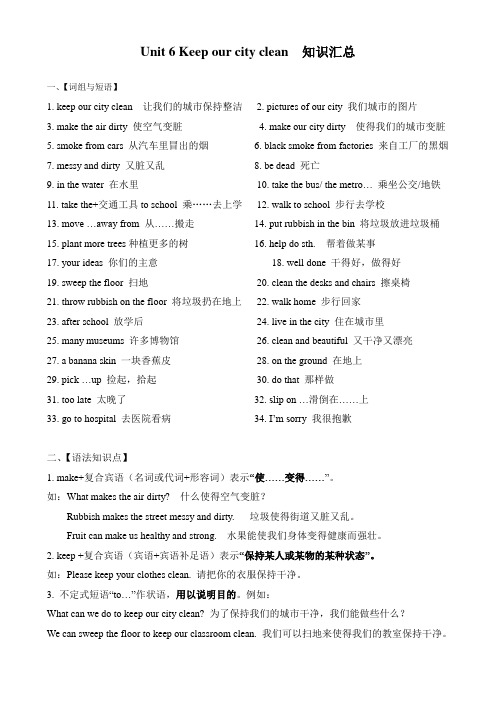
Unit 6 Keep our city clean 知识汇总一、【词组与短语】1. keep our city clean 让我们的城市保持整洁2. pictures of our city 我们城市的图片3. make the air dirty 使空气变脏4. make our city dirty 使得我们的城市变脏5. smoke from cars 从汽车里冒出的烟6. black smoke from factories 来自工厂的黑烟7. messy and dirty 又脏又乱8. be dead 死亡9. in the water 在水里10. take the bus/ the metro…乘坐公交/地铁11. take the+交通工具to school 乘……去上学12. walk to school 步行去学校13. move …away from 从……搬走14. put rubbish in the bin 将垃圾放进垃圾桶15. plant more trees种植更多的树16. help do sth. 帮着做某事17. your ideas 你们的主意18. well done 干得好,做得好19. sweep the floor 扫地20. clean the desks and chairs 擦桌椅21. throw rubbish on the floor 将垃圾扔在地上22. walk home 步行回家23. after school 放学后24. live in the city 住在城市里25. many museums 许多博物馆26. clean and beautiful 又干净又漂亮27. a banana skin 一块香蕉皮28. on the ground 在地上29. pick …up 捡起,拾起30. do that 那样做31. too late 太晚了32. slip on …滑倒在……上33. go to hospital 去医院看病34. I’m sorry 我很抱歉二、【语法知识点】1. make+复合宾语(名词或代词+形容词)表示“使……变得……”。
小学牛津6A_Unit6默写
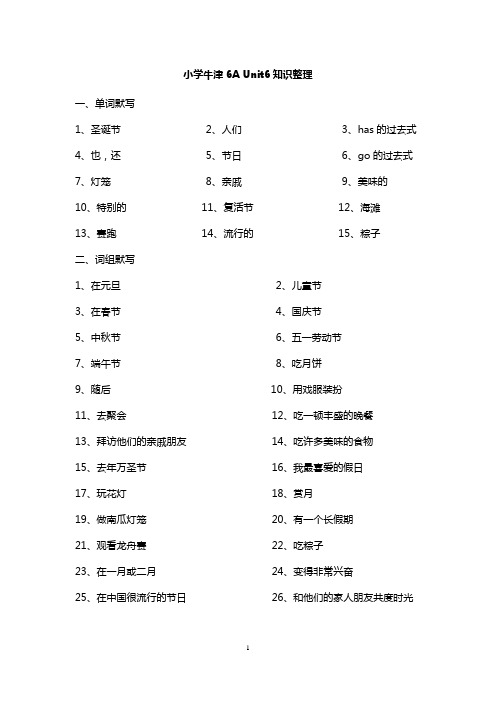
小学牛津6A Unit6知识整理
一、单词默写
1、圣诞节
2、人们
3、has的过去式
4、也,还
5、节日
6、go的过去式
7、灯笼
8、亲戚
9、美味的10、特别的11、复活节12、海滩
13、赛跑14、流行的15、粽子
二、词组默写
1、在元旦
2、儿童节
3、在春节
4、国庆节
5、中秋节
6、五一劳动节
7、端午节8、吃月饼
9、随后10、用戏服装扮
11、去聚会12、吃一顿丰盛的晚餐
13、拜访他们的亲戚朋友14、吃许多美味的食物
15、去年万圣节16、我最喜爱的假日
17、玩花灯18、赏月
19、做南瓜灯笼20、有一个长假期
21、观看龙舟赛22、吃粽子
23、在一月或二月24、变得非常兴奋
25、在中国很流行的节日26、和他们的家人朋友共度时光
1
三、句子默写
1、春节在什么时候?它在一月或者二月。
2、在春节人们通常会做什么?
3、他们通常吃许多美味的食物。
4、去年春节你吃了许多美味的食物吗?是的。
5、今天格林老师正在和他的学生们谈论有关节日的事。
6、我特别喜爱的节日是万圣节。
7、你上个中秋节办聚会了吗?不,我没有。
2。
牛津6A单词词组默写
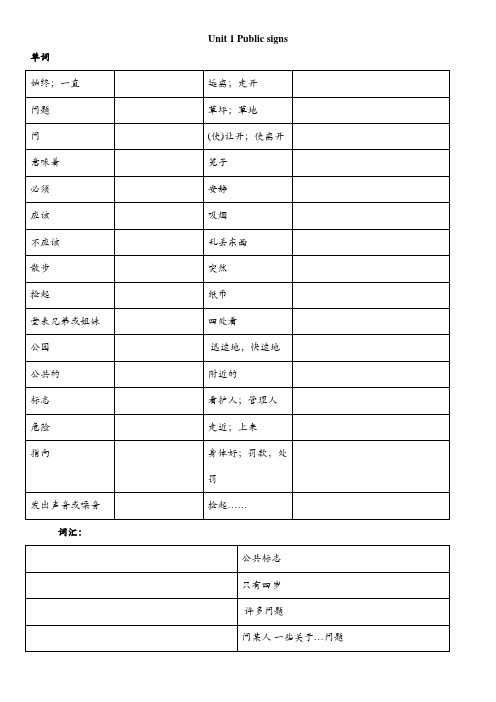
门铃
礼物;赠品
一月
第一
二月
第二
七月
三月
八月
第三
九月
四月
十月
第四
十一月
五月
十二月
第五
第十二
第六
第二十
等待
第二十一
影视光碟
脱下
词汇:
住在Ben的附近
一起回家
放学后
拜访、看望某人/参观某地
在Ben的班上
谈论某人的生日
快到了
在十月16日
来参加我的生日聚会
举办生日聚会
作为生日礼物
一盘日本卡通的影视光碟
等着瞧。
春节
今天清晨
Unit 3 It was there
单词
is,am过去式
照相机
激动的;兴奋
胶卷
片刻,瞬间
光盘随身听
以前
跑步比赛
are的过去式
地面
刚才
卷
移动电话
体育运动日
眼镜
令人激动的
日记
记得
耳机
were not=weren’t
词汇:
体育运动日
全体学生
兴奋的
赛跑
观看赛跑
想要做某事
拍照片
拍些/许多照片
寻找
吃冰淇凌
散步
看到草地上有一些东西
一张10元钱/两张百元大钞/一个一元硬币
环顾四周
把它/它们拣起
拣起纸币
公园管理者
走近某人
指向
对某人说---
那边
罚款十元/罚某人款/
给我十元
玩关于….的游戏
再试一试
穿着绿色的毛衣男孩
摇摇头
早餐想要面包
牛津译林英语6A Unit 6 Keep our city clean 单元知识点归纳

6A Unit 6 Keep our city clean 单元知识归纳一、词组1. keep our city clean保持我们的城市整洁2. look at these pictures of our city看我们城市的这些图片3. make our city dirty 使我们的城市变脏4. smoke from cars汽车尾气5. make the air dirty使空气变脏6. black smoke from factories来自工厂的黑烟7. make the streets messy使街道变乱8. in the water在水里9. take the bus and the metro to school乘公共车和地铁上学10. walk to school走路上学11. move some factories away把工厂搬走12. put rubbish in the bin把垃圾放进垃圾箱13. plant more trees种更多的树14. help keep the air clean有助于保持空气洁净15. your ideas你们的主意16. well done干得好17. throw rubbish on the floor 把垃圾扔在地上18. walk home 走回家19. after school放学后20.live in the city 住在城里21. clean and beautiful又干净又漂亮22. throw a banana skin on the ground把香蕉皮扔在地上23. eat bananas吃香蕉24. do that那样做25. pick it up 把它捡起来26. too late 太迟了27. slip on the banana skin在香蕉皮上滑倒28. go to hospital 去医院(看病)二、句子1. What makes the air dirty? 什么使空气变脏? Smoke makes the air dirty.烟雾使空气变脏。
牛津小学英语6A各单元 知识梳理
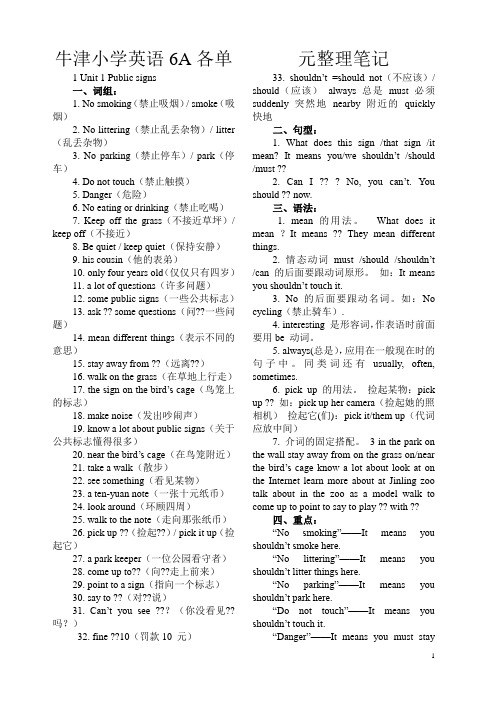
牛津小学英语6A各单元整理笔记1 Unit 1 Public signs一、词组:1. No smoking(禁止吸烟)/ smoke(吸烟)2. No littering(禁止乱丢杂物)/ litter (乱丢杂物)3. No parking(禁止停车)/ park(停车)4. Do not touch(禁止触摸)5. Danger(危险)6. No eating or drinking(禁止吃喝)7. Keep off the grass(不接近草坪)/ keep off(不接近)8. Be quiet / keep quiet(保持安静)9. his cousin(他的表弟)10. only four years old(仅仅只有四岁)11. a lot of questions(许多问题)12. some public signs(一些公共标志)13. ask ?? some questions(问??一些问题)14. mean different things(表示不同的意思)15. stay away from ??(远离??)16. walk on the grass(在草地上行走)17. the sign on the bird’s cage(鸟笼上的标志)18. make noise(发出吵闹声)19. know a lot about public signs(关于公共标志懂得很多)20. near the bird’s cage(在鸟笼附近)21. take a walk(散步)22. see something(看见某物)23. a ten-yuan note(一张十元纸币)24. look around(环顾四周)25. walk to the note(走向那张纸币)26. pick up ??(捡起??)/ pick it up(捡起它)27. a park keeper(一位公园看守者)28. come up to??(向??走上前来)29. point to a sign(指向一个标志)30. say to ??(对??说)31. Can’t you see ???(你没看见??吗?)32. fine ??10(罚款10 元)33. shouldn’t =should not(不应该)/ should(应该)always 总是must 必须suddenly 突然地nearby 附近的quickly 快地二、句型:1. What does this sign /that sign /it mean? It means you/we shouldn’t /should /must ??2. Can I ?? ? No, you can’t. You should ?? now.三、语法:1. mean 的用法。
小学英语六年级上册(牛津上海版) Unit6 going to school 知识点总结
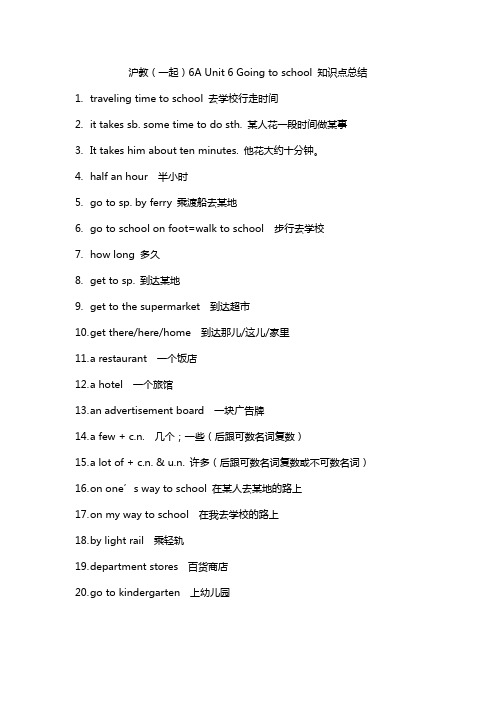
沪教(一起)6A Unit 6 Going to school 知识点总结1.traveling time to school 去学校行走时间2.it takes sb. some time to do sth. 某人花一段时间做某事3.It takes him about ten minutes. 他花大约十分钟。
4.half an hour 半小时5.go to sp. by ferry 乘渡船去某地6.go to school on foot=walk to school 步行去学校7.how long 多久8.get to sp. 到达某地9.get to the supermarket 到达超市10.g et there/here/home 到达那儿/这儿/家里11.a restaurant 一个饭店12.a hotel 一个旅馆13.a n advertisement board 一块广告牌14.a few + c.n. 几个;一些(后跟可数名词复数)15.a lot of + c.n. & u.n. 许多(后跟可数名词复数或不可数名词)16.o n one’s way to school 在某人去某地的路上17.o n my way to school 在我去学校的路上18.b y light rail 乘轻轨19.d epartment stores 百货商店20.g o to kindergarten 上幼儿园语言点1. near 离…很近后面直接接地点I live near school.=My home is near school.我家离学校很近。
2. far away from=far from离…很远He lives far away from school.=His home is far from school.他家离学校很远3.by bus/bike/car/underground/train/ferry动词短语:take a bus/bike/car/underground/train/ferry ride a bikeHe goes to school by bus.=He takes a bus to school.4. on foot 动词:walkShe goes to work on foot every day.=She walks to work every day.5. It takes sb. some time to do sth. 花费某人多少时间做某事。
小学英语六年级上册(牛津上海版) Unit6 going to school 知识点总结

沪教(一起)6A Unit 6 Going to school 知识点总结1.traveling time to school 去学校行走时间2.it takes sb. some time to do sth. 某人花一段时间做某事3.It takes him about ten minutes. 他花大约十分钟。
4.half an hour 半小时5.go to sp. by ferry 乘渡船去某地6.go to school on foot=walk to school 步行去学校7.how long 多久8.get to sp. 到达某地9.get to the supermarket 到达超市10.g et there/here/home 到达那儿/这儿/家里11.a restaurant 一个饭店12.a hotel 一个旅馆13.a n advertisement board 一块广告牌14.a few + c.n. 几个;一些(后跟可数名词复数)15.a lot of + c.n. & u.n. 许多(后跟可数名词复数或不可数名词)16.o n one’s way to school 在某人去某地的路上17.o n my way to school 在我去学校的路上18.b y light rail 乘轻轨19.d epartment stores 百货商店20.g o to kindergarten 上幼儿园语言点1. near 离…很近后面直接接地点I live near school.=My home is near school.我家离学校很近。
2. far away from=far from离…很远He lives far away from school.=His home is far from school.他家离学校很远3.by bus/bike/car/underground/train/ferry动词短语:take a bus/bike/car/underground/train/ferry ride a bikeHe goes to school by bus.=He takes a bus to school.4. on foot 动词:walkShe goes to work on foot every day.=She walks to work every day.5. It takes sb. some time to do sth. 花费某人多少时间做某事。
牛津译林新版6Aunit6知识点与练习

Unit6 Keep the city clean课本内容知识点讲解:“继续”的意思,后面加动词ing形式,即keep+doing;作为系动词时,表示“保留”的意思,后面跟形容词,即keep+sth+adj(形容词)2.clean表示动词含义为“清扫”,例如:clean the classroom ,表示形容词含义为“干净的”,同义词tidy,反义词dirty3.What makes our city dirty ? 这句话要注意:首先what后面的make应该用三单,第二点make表示含义为“使....”make后面加动词为原型,即:make+do+sth ;后面加形容词为“make sb +adj 意为:使某人怎么样4.smoke 作为动词表示“吸烟”,No smoking! ;表示名词意为“烟雾”,为不可数名词,不可数名词或可数名词单数的be动词都用is或was,实意动词用三单。
5.Smoke from cars makes the air dirty.这儿makes用三单形式,是因为smoke是不可数名词,跟cars无关,因为使空气变脏的是车子排出烟雾,而不是车子。
6.Factory意为工厂,复数形式:因为是辅音字母加y结尾的,去y变ies.7.Rubbish 意为垃圾,为不可数名词,垃圾桶为“dustbin”8.Messy意为混乱的,为形容词,它的名词形式为“mess“,常用词组“in a mess”.9.dead为形容词,意为“死亡的”,例如:a dead bird .动词形式为:die; 名词形式为“death”10.What can we do to keep our city clean? 中文意思为“我们能做什么去使我们的城市干净?”这儿在do与keep之间加了个to,表示目的,这儿注意“to”不能省略。
11.Walk to school 走路去学校walk home 走路回家,home前不能用介词to,但是可以用其他介词,比如说:at home12.Move....away 把.....移走keep.....away 使.....远离13.put....in.....把.....放进.....14.Plant trees 植树,在这儿plant 为动词,种植的意思,plant 作为名词含义为“植物”15.Well done。
牛津6A Unit 6 Going to school --知识总结与默写 学生版

Unit 6 Going to school 默写版★Key words:1_______ v.旅行(_______/________; _______/_______; ______/_______;_______) _______________去学校的行程时间____________去上海旅行___________环游世界_________ n.旅行(_________)____________旅行社___________ n. 旅行者2. ________n. 广告____________________ 在当地报纸刊登一则广告__________v.做广告______________________征聘一位新经理★Phrases:1________________________去旅行2________________________到某地旅行3__________=__________ =__________坐渡轮________________________= ________________________做地铁(类似by train=________, by bus=_______, by car=________)go to some place by + n.= go to some sp. ____/ _____/ +a/an/the +n=____a/an/the +n. __ sp. 4by + bus,ferry/ underground,subway/ car/ taxi/ ____(有轨电车)/______(迷你公交车) / ________(轻轨)/__________(磁悬浮)/______________(双层巴士)________________________先乘……再转乘….:5________________________ = ________________________半小时6________________________ = ________________________一个半小时7________________________ = ________________________步行去某地8________________________ 在广告牌上9________________________ 一些= ____________________ (区别few少得几乎没有) 10________________________一些= ___________________ (修饰不可数名词,区别little)11_______ =________=_____/______=_________ 许多12___________________百货商店13___________________在居民区14___________________ 在邮局15___________________ 在警察局16___________________在某人去某地的路上___________________在我上学的路上经常看到一位老人。
6A Unit6 单词短语默写
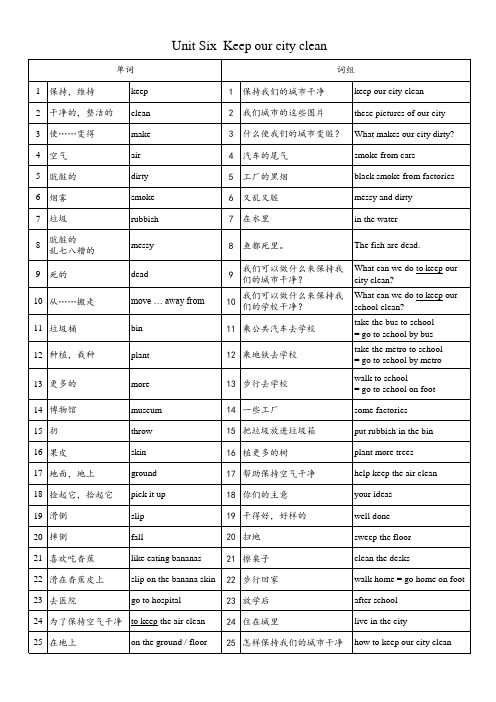
25 在地上
on the ground / floor 25 怎样保持我们的城市干净 how to keep our city clean
11 乘公共汽车去学校
12 乘地铁去学校
What can we do to keep our city clean?
What can we do to keep our school clean?
take the bus to school = go to school by bus
take the metro to school = go to school by metro
13 步行去学校
walk to school = go to school on foot
14 一些工厂
some factories
15 扔 16 果皮 17 地面,地上 18 捡起它,拾起它 19 滑倒 20 摔倒 21 喜欢吃香蕉
throw skin ground pick it up slip fall like eating bananas
11 垃圾桶
bin
12 种植,栽种
plant
13 更多的 14 博物馆
more museum
1 保持我们的城市干净
keep our city clean
2 我们城市的这些图片
these pictures of our city
3 什么使我们的城市变脏? What makes our city dirty?
Unit Six Keep our city clean
单词
词组
1 保持,维持
2 干净的,整洁的
3 使……变得
4 空气
5 肮脏的
2015新版牛津小学6AUnit6知识点(1)
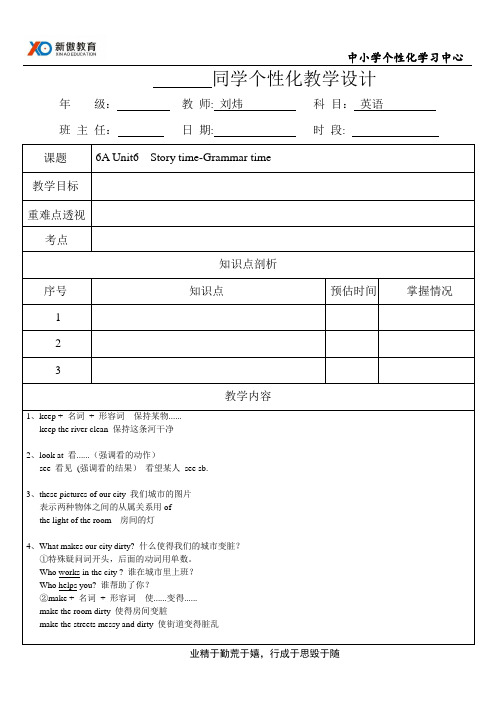
同学个性化教学设计年级:教师: 刘炜科目:英语班主任:日期: 时段:课题6A Unit6 Story time-Grammar time教学目标重难点透视考点知识点剖析序号知识点预估时间掌握情况123教学内容1、keep + 名词+ 形容词保持某物......keep the river clean 保持这条河干净2、look at 看......(强调看的动作)see 看见(强调看的结果)看望某人see sb.3、these pictures of our city 我们城市的图片表示两种物体之间的从属关系用ofthe light of the room 房间的灯4、What makes our city dirty? 什么使得我们的城市变脏?①特殊疑问词开头,后面的动词用单数。
Who works in the city ? 谁在城市里上班?Who helps you? 谁帮助了你?②make + 名词+ 形容词使......变得......make the room dirty 使得房间变脏make the streets messy and dirty 使街道变得脏乱5、Smoke from cars makes the air dirty.smoke 烟;烟雾不可数名词smoke from cars 来自汽车的烟雾注意真正的主语是smoke,而不是cars,所以后面的make要用三单。
6、factory 工厂复数:factories7、too 也用在句尾also 也用在句中8、rubbish 垃圾不可数名词much rubbish 许多垃圾a lot of rubbish9、there be 句型be动词的选择如果后面的名词是单数名词或者不可数名词,那么be动词用is如果后面的名词是复数可数名词,那么就用are注意就近原则10、dead 死的a dead tree 一棵枯树a dead flower 一朵枯萎的花11、What can we do to keep our city clean? 我们可以做什么来保持我们的城市干净?12、take the bus 乘公交车= go to ......by bustake the metro 乘地铁=go to......by metrotake 后面必须加a/an/the 放在句中by后面直接加交通工具放在句尾13、walk to school = go to school on foot 步行去学校14、move......away from......把......搬离......move some factories away from our city 把一些工厂搬离我们的城市15、put......in......把......放入......16、many/much 许多的more 更多的+ 可数名词/不可数名词16、help sb. do sth. 帮助某人做某事They help keep the air clean. 它们帮助保持空气干净。
6A Unit6知识点-自己整理

6A Unit 6知识点一、词组1. 我们城市的这些图片these pictures of our city2. 我们的城市our city3. 使我们的城市变脏make our city dirty4. 汽车尾气smoke from cars5. 使空气变脏make the air dirty6. 工厂的黑烟black smoke from factories7. 使街道脏乱make the streets messy and dirty8. 又乱又脏messy and dirty9. 水里的垃圾rubbish in the water 10. 死鱼dead fish11.保持城市干净keep our city clean 12. 乘公交车take the bus13. 乘地铁上学take the metro to school 14. 步行去学校walk to school = go to school on foot15. 把工厂搬离我们的城市move some factories away from our city16. 把垃圾放进垃圾箱put rubbish in the bin 17. 种植更多的树plant more trees18. 帮助净化空气help keep the air clean 19. 你的主意your ideas20. 干得好well done 21. 扫地sweep the floor22. 擦桌椅clean the desks and chairs 23. 在地上扔垃圾throw rubbish on the floor 24. 放学后步行回家walk home after school 25. 住在城市live in the city26. 许多电影院many cinemas 27. 许多博物馆many museums28. 又干净又美丽clean and beautiful 29. 扔一个香蕉皮throw a banana skin30. 在地上on the ground 31. 捡起它pick it up 捡起它们pick them up 32. 喜欢吃香蕉like eating bananas 33. 不应该做那样的事情shouldn’t do that 34. 使街道变乱make the street messy 35. 太迟了too late36. 在香蕉皮上滑倒slip on the banana skin and fall 37. 去医院go to the hospital38. 怎样保持我们学校整洁how to keep our school clean 住院go to hospital39. 飞走fly away 40. 回来come back41. two little blackbirds 两只小乌鸦42. 坐在小山上sit on the hill二、句型1. 看我们城市的这些图片。
牛津6A Unit 6 Going to school --知识总结与默写 教师版

Unit 6 Going to school★Key words:1.travel v.(travelling/traveling; travelled/traveled; travelled/traveled;travels)travelling time to school去学校的行程时间travel to Shanghai 去上海旅行travel around the world环游世界travel n.(travels) the travel agency旅行社travel(l)er n. 旅行者2. advertisement n. put an advertisement in the local paper 在当地报纸刊登一则广告advertise v.做广告advertise for a new manager征聘一位新经理★Phrases:1.go travel(l)ing 去旅行2.travel to (Shanghai) 到某地旅行3.go by ferry =take a ferry =on the ferry坐渡轮by underground=on the underground 做地铁(类似by train=on the train, by bus=on the bus, by car=in the car)go to some place by + n.= go to some sp. in/ on/ +a/an/the +n=take a/an/the +n. to sp.4.by + bus,ferry/ underground,subway/ car/ taxi/ tram(有轨电车)/minibus(迷你公交车) /light rail(轻轨)/ maglev train(磁悬浮)/double-decker bus(双层巴士)by…, then by…先乘……再转乘….:5.half an hour = thirty minutes 半小时6.one and a half hours=one hour and a half 一个半小时7.go to sp.on foot=walk to sp.步行去某地8.on an advertisement board 在广告牌上9. a few minutes 一些=some (区别few少得几乎没有)10.a little milk 一些=some (修饰不可数名词,区别little)11.a lot of =lots of=many/much=plenty of 许多12.department store 百货商店13.in the housing estate 在居民区14.in the post office 在邮局15.in the police station 在警察局16.on one’s way to sp 在某人去某地的路上I often see an old lady on my way to school.在我上学的路上经常看到一位老人。
牛津沪教版六年级上6A-Unit 6知识点梳理 + 拓展阅读

Unit 6 Going to school知识点梳理I. Useful words and expressions1. – How do you go to school.– I go to school on foot /by bus.how用于对交通方式的提问。
I go to school on foot. = I walk to school.I go to school by bus. = I take a bus to school.2. It takes me about half an hour to get there.half an hour 半小时。
get to 到达,后接here, there, home等词时要省略to。
get there 到达那里。
3. I go to school by bus, then on foot.then在这里表示“然后”,表现出做事的先后顺序。
II. Word studyadvertise v. 刊登广告→advertisement n. 广告factory n. 工厂→factories n. 工厂(复数)III. Language explanation1. – How long does it take to get to the supermarket?– It takes me ten minutes to get there.How long 用于对时间长短的提问, “多久”,“多长时间”。
It takes sb. some time to do sth. 花费某人多长时间去做某事。
= Sb. spend some time on sth. / (in) doing sth.e.g., It takes me about an hour to finish my homework every day= I spend about an hour on / (in) finishing my homework every day.It takes sb. some time to do sth 此句中,sb如果是代词,必须使用宾格形式。
牛津版六年级上册Unit 6 知识点总结
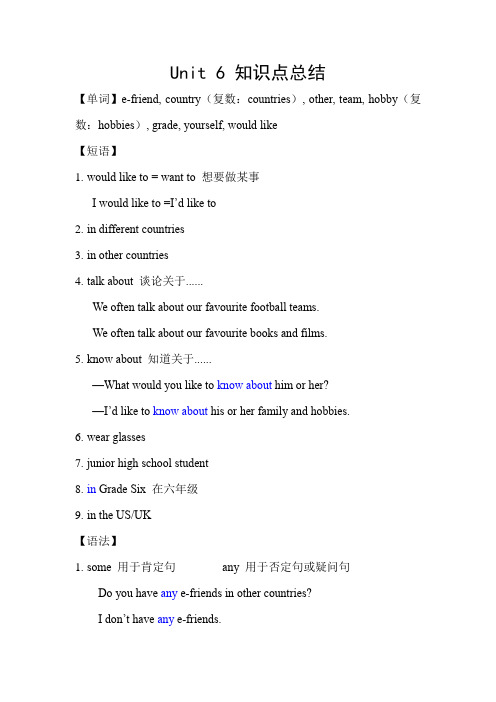
Unit 6 知识点总结【单词】e-friend, country(复数:countries), other, team, hobby(复数:hobbies), grade, yourself, would like【短语】1.would like to = want to 想要做某事I would like to =I’d like to2.in different countries3.in other countries4.talk about 谈论关于......We often talk about our favourite football teams.We often talk about our favourite books and films.5.know about 知道关于......—What would you like to know about him or her?—I’d like to know about his or her family and hobbies.6.wear glasses7.junior high school student8.in Grade Six 在六年级9.in the US/UK【语法】1.some 用于肯定句any 用于否定句或疑问句Do you have any e-friends in other countries?I don’t have any e-friends.2.get... from...从......得到......I get your email from the E-friend Club.3.like + 动词ingI like playing football.love + 动词ingI love playing football.【句子】1.I have some e-friends in different countries.2.We both like football.3.反问对方:你呢?What about you?How about you?4.Would you like to have e-friends in other countries?—Would you like to have one?—Yes, I’d like to have an e-friend in the US.5.I’d like to be your e-friend.I’d like to be your e-friend too.6.I am from China. I am 11 years old, and I wear glasses.7.There are four people in my family: my father, my mother, my brother Ben and me.8.I go to Happy Primary School. I am in Grade Six.9.My favourite subjects are Maths and Music. I like singing and playingtable tennis. I also like reading.Science and English are my favourite subjects. I like playing football and chess.10.Please write back soon and tell me about yourself.Write soon.11.Thank you for your email and your photo.【国家和城市】AustraliaCanadathe UK Londonthe USFrance ParisJapan TokyoChina Beijing【复习回顾】1.be from...来自......He is from the UK.She is from China.2.人名’s ...的Peter’s e-friend Peter的网友Jill is Peter’s e-friend.Joe can be Kitty’s e-friend.【写作】注意写信、电子邮件的格式。
- 1、下载文档前请自行甄别文档内容的完整性,平台不提供额外的编辑、内容补充、找答案等附加服务。
- 2、"仅部分预览"的文档,不可在线预览部分如存在完整性等问题,可反馈申请退款(可完整预览的文档不适用该条件!)。
- 3、如文档侵犯您的权益,请联系客服反馈,我们会尽快为您处理(人工客服工作时间:9:00-18:30)。
小学牛津6A Unit6知识整理
姓名:成绩:一、根据课文内容填空
Holidays
When? What do people usually do? New Year’s Day
Easter
May Day
Dragon Boat
Festival
Children’s Day
National Day
Mid-Autumn
Festival
Halloween
Christmas
Spring Festival
二、单词默写
1、圣诞节
2、人们
3、has的过去式
4、也,还
5、节日
6、go的过去式
7、灯笼8、亲戚9、美味的
10、特别的11、复活节12、海滩
13、赛跑14、流行的15、粽子
三、词组默写
1、在元旦
2、儿童节
3、在春节
4、国庆节
5、中秋节
6、五一劳动节
7、端午节8、吃月饼
9、随后10、用戏服装扮
11、去聚会12、吃一顿丰盛的晚餐
13、拜访他们的亲戚朋友14、吃许多美味的食物
15、去年万圣节16、我最喜爱的假日
17、玩花灯18、赏月
19、做南瓜灯笼20、有一个长假期
21、观看龙舟赛22、吃粽子
23、在一月或二月24、变得非常兴奋
25、在中国很流行的节日26、和他们的家人朋友共度时光
四、句子默写
1、春节在什么时候?它在一月或者二月。
2、在春节人们通常会做什么?
3、他们通常吃许多美味的食物。
4、去年春节你吃了许多美味的食物吗?是的。
5、今天格林老师正在和他的学生们谈论有关节日的事。
6、我特别喜爱的节日是万圣节。
7、你上个中秋节办聚会了吗?不,我没有。
